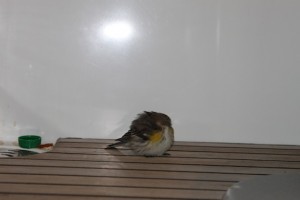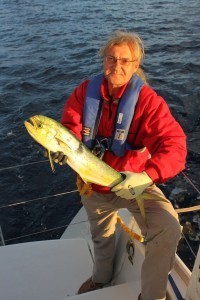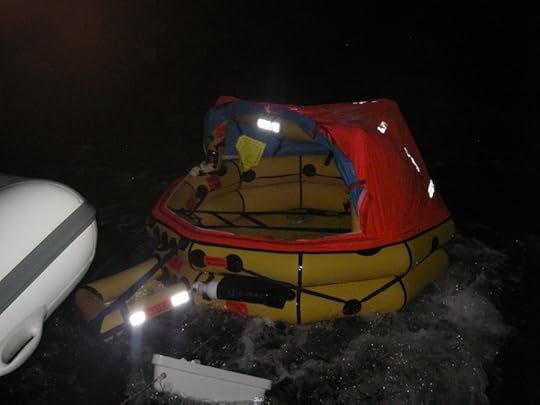Problems, part II, aka Adaptation
Yes, I need to give a huge thanks to my friend Barbara who got something on the blog while I was struggling last night in St. Georges Harbor to pull in the one and only unlocked Internet connection after watching about 15 boats arrive after we did. There just wasn't any bandwidth left and I couldn't post the blog I had written. It's now nearly 2:00 in the afternoon and I've made it ashore and I'm ensconced in Bermuda Yacht Services' office with access to wifi and I'll copy and paste here what I wrote last night.
After all those days of waiting, the Caribbean 1500 fleet finally got to leave Hampton, VA on 11/11/11. And we had bananas aboard, but then I'm not superstitious. I think. One of the qualities that any sailing writer must possess is the ability to adapt. Richard finds himself suddenly on a delivery in Columbia and Mike is having to fudge on his promise to publish by November first or else – and the crew of the Emmy Kate is having to adapt to our circumstances that have led us to Bermuda.
Yes, Bermuda is the new Tortola for many boats in the Caribbean 1500 fleet. This is a rally, not a race, and when we found ourselves in the middle of a high pressure on the second day of the trip and we had little or no wind, we cranked up the engine and began to motor. And motor. And motor. Like most smaller sailboats, there is a limit to how much diesel we can carry and after two and a half days of motorsailing east in southeast winds, I jokingly said to another crew member, "Maybe we should stop in at Bermuda for more fuel." Soon, as we started to do more calculations and what little wind we had continued to blow from the very direction we wanted to travel, and the idea started to sound better and better. So that's how we ended up anchored here in St. Georges, Bermuda along with at least five other boats from the fleet and about twenty-five other southbound boats that are waiting on weather.
Most of the others will continue, but this crew's journey has come to an end here. More on that later.  All this doesn't mean we didn't have a great time and many adventures, though. There were many hours when we sailed at five knots in 10-12 knots of wind. At the start of the race when we had strong winds for the first day, we actually saw this cat hit 9-10 knots of speed. We caught two mahi-mahi, one tuna, one marlin (that never made it onto the boat), and lots of weed. We also caught a nice ball of polypropylene line on one of the props, and I got to go swimming in mid-ocean with a sharp knife to cut it free. We ate great meals and played host to a tiny bird who joined us one night and slept in the cockpit until dawn.
All this doesn't mean we didn't have a great time and many adventures, though. There were many hours when we sailed at five knots in 10-12 knots of wind. At the start of the race when we had strong winds for the first day, we actually saw this cat hit 9-10 knots of speed. We caught two mahi-mahi, one tuna, one marlin (that never made it onto the boat), and lots of weed. We also caught a nice ball of polypropylene line on one of the props, and I got to go swimming in mid-ocean with a sharp knife to cut it free. We ate great meals and played host to a tiny bird who joined us one night and slept in the cockpit until dawn.
Like on any new boat, we were all getting used to the noises, the creaks and groans that any boat makes at sea. I kept claiming that I thought the boat might be haunted because I kept hearing a woman singing (finally figured out it was the autopilot). But last night as we were motoring and pounding into fifteen knots of wind rounding the infamous reefs off the north end of Bermuda on the dark of the moon, I told Bob that I'd heard another sort of singing. He stood up because he'd heard that high-pitched tone too and we both looked aft. Neither of us could believe our eyes. We were being followed by this bright orange apparition with a flashing strobe on top. Our five-man Winslow liferaft that had been stowed under the aft deck of the cat had executed a perfect launch off our stern and was merrily bobbling along at five knots in our wake. Bob and I looked at each other and said, "What the f*?" We slowed the boat and brought it up to the stern and soon realized there was no way we were going to get it aboard. So now the crew of the Emmy Kate can claim a first — we were the first boat to arrive in Bermuda at 3:00 a.m. and tie up to the Customs dock while towing a beautifully deployed liferaft, complete with drogue and water ballast pouches. And we laughed, and laughed, and laughed. What else could we do?
 And adapting to this situation means that our trip aboard Emmy Kate has come to an end. There is no way to get the raft repacked here and you cannot send new life rafts via FedEx or the like. They have to travel as cargo. So, the soonest the raft could be replaced is a couple of weeks and we cannot sit here that long. The owners must return to their lives and they will put the boat in a marina or on a mooring here in Bermuda and hire a delivery crew in a few weeks because the boat is going into charter work in Tortola for the winter.
And adapting to this situation means that our trip aboard Emmy Kate has come to an end. There is no way to get the raft repacked here and you cannot send new life rafts via FedEx or the like. They have to travel as cargo. So, the soonest the raft could be replaced is a couple of weeks and we cannot sit here that long. The owners must return to their lives and they will put the boat in a marina or on a mooring here in Bermuda and hire a delivery crew in a few weeks because the boat is going into charter work in Tortola for the winter.
Meanwhile, poor me, I get to spend the next few days touring this island I have never visited – which incidentally is a location in the new novel, Circle of Bones. Gee, life is tough, but I can adapt. And since I have been seeing all these boats coming in fleeing the bad weather to the south and waiting it out, I've also seen many boats losing their crew due to the long wait here. I'm considering putting out a shingle about crew for hire and hoping to find another ride to Tortola that will put a few shillings in my pocket. If not, I'll head home to Lauderdale for Thanksgiving. Such is the life of the sailing writer.
Fair winds
Christine
Share on Facebook



